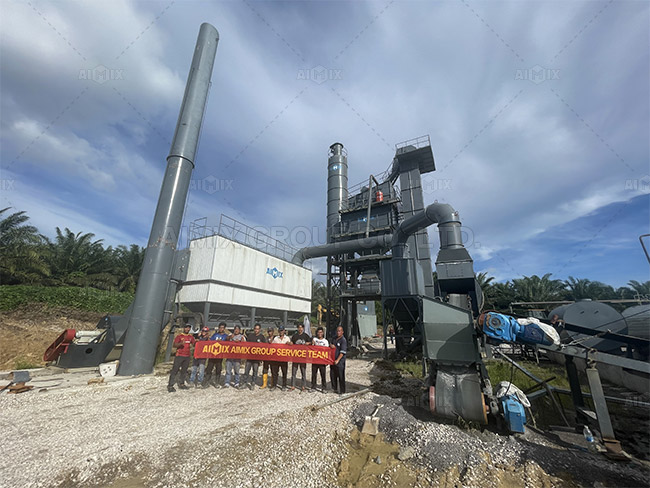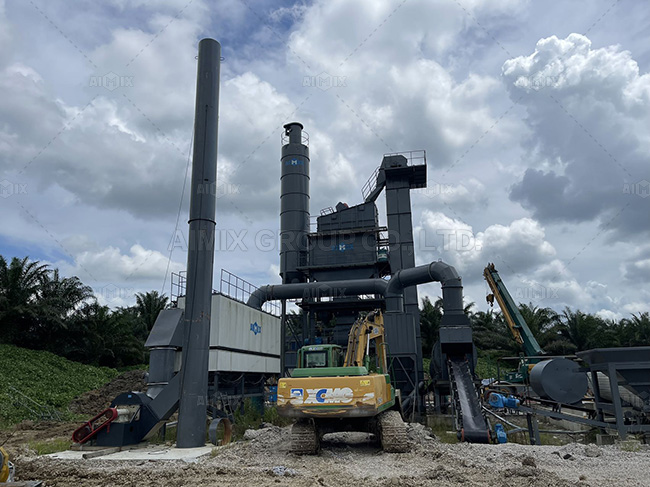In the realm of road construction and infrastructure development, asphalt plants play a pivotal role in producing the essential material that forms the backbone of our transportation networks. However, not all asphalt plants are created equal, and choosing the right type of plant can significantly impact the efficiency and quality of asphalt production. In this article, we will explore two prominent types of asphalt plants: Continuous and Batch Asphalt Plants, highlighting their working principles, benefits, and limitations to help construction professionals make informed decisions.
Continuous Asphalt Plants
A. Overview and Working Principle
Continuous asphalt plants, as the name suggests, are designed for uninterrupted production of asphalt. These asphalt plants sale in AIMIX operate in a continuous cycle, without the need to stop or pause for mixing or batching. The raw materials, including aggregates, bitumen, and filler, are continuously fed into the system, ensuring a steady output of high-quality asphalt.
The key components of a continuous asphalt plant include a cold feed system, a drying drum, a multi-fuel burner, a hot elevator, and a high-efficiency dust collector. The drying drum plays a crucial role, as it facilitates the drying and heating of aggregates, ensuring that they reach the necessary temperature before mixing with the bitumen.

B. Advantages and Benefits
Continuous asphalt plants offer several advantages that make them an attractive choice for large-scale projects:
High Production Capacity: These plants can produce asphalt in large quantities, making them suitable for high-demand projects and busy construction sites.
Consistent Quality: The continuous process ensures a consistent and uniform mixture, leading to high-quality asphalt with improved durability and performance.
Energy Efficiency: The continuous operation reduces energy consumption as there is no need to restart the small portable asphalt mix plant between batches, leading to cost savings in the long run.
Less Wastage: The continuous nature of production minimizes material wastage, enhancing overall efficiency and reducing project costs.
Batch Asphalt Plants
A. Overview and Working Principle
Unlike continuous asphalt plants, batch asphalt plants follow a different production approach. The process involves the precise measurement and mixing of predetermined quantities of raw materials in batches. Each batch is thoroughly mixed in a pug mill or a twin-shaft mixer before being discharged into storage silos.

The key components of a batch asphalt plant include cold aggregate bins, a conveyor system, a batch tower, a pug mill mixer, and storage silos. The cold aggregate bins store different sizes of aggregates, which are then extracted, weighed, and transferred to the mixing unit.
B. Advantages and Limitations
Batch asphalt plants offer specific advantages that cater to certain project requirements:
Flexibility: Batch plants can easily switch between different mix formulations, making them ideal for small to medium-sized projects with varying asphalt specifications.
Accurate Control: The batch process allows for precise control over the mixing ratios, resulting in consistent and customized asphalt mixes. Find more here: https://aimixasphaltplant.com/asphalt-batching-plant-price/
Easy Maintenance: Batch plants are generally easier to maintain and repair compared to continuous plants, thanks to their modular and compact design.
However, it’s essential to acknowledge some limitations of batch asphalt plants:
Lower Production Capacity: Batch plants have a lower production capacity compared to continuous plants, making them less suitable for high-volume projects.
Interruptions in Production: The batching process involves intermittent production, which may lead to slight variations in asphalt quality between batches.
Conclusion
In conclusion, choosing between continuous and batch asphalt plants depends on the specific requirements of the construction project. Continuous plants offer high production capacity and consistent quality, making them ideal for large-scale ventures. On the other hand, mix asphalt plants provide flexibility and accurate control, catering to smaller projects with varying asphalt specifications. By understanding the working principles and the advantages and limitations of each type, construction professionals can make well-informed decisions to optimize asphalt production and ensure the success of their projects.
